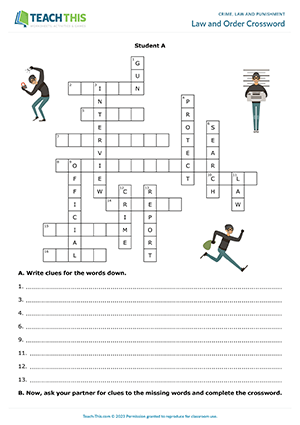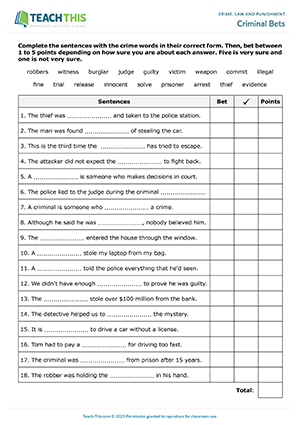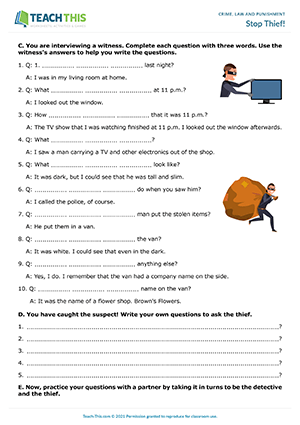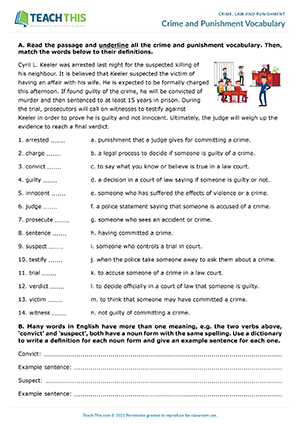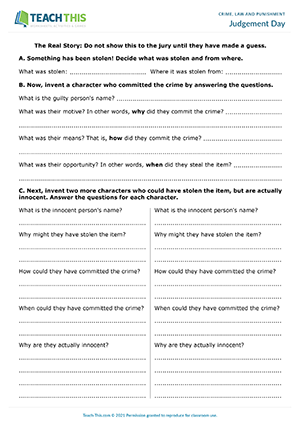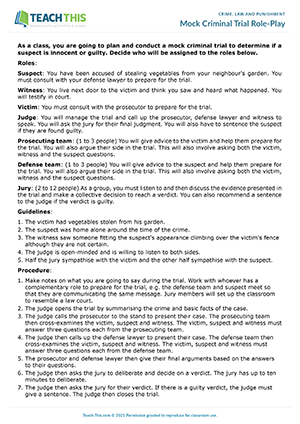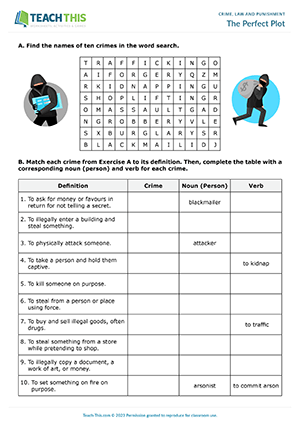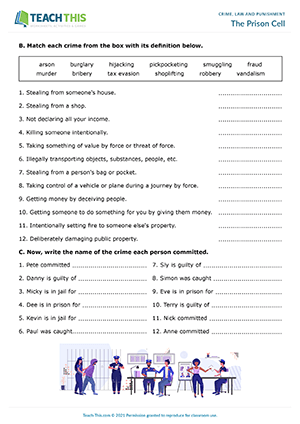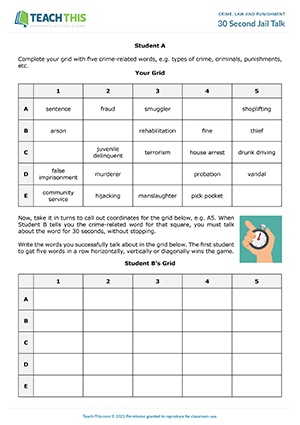In this useful crime vocabulary activity, students do a crossword where they describe and guess words related to crime, law and punishment. In two groups, students invent and write down clues for the crime, law and punishment words on their crosswords. Next, students pair up with someone from the other group and take turns asking their partner for a clue to one of their missing words, e.g. 'What's two across?' Their partner reads out the clue for that word, and the other student tries to guess what it is. If the student guesses the word successfully, they write it on their crossword. If not, their partner continues to give more clues until the student guesses the word. Afterwards, students check their spelling by comparing crosswords.
In this free crime and punishment vocabulary game, students complete sentences with crime-related words and then place bets on their answers. First, students complete sentences with crime-related vocabulary, making sure the verbs are in the correct tense. Students then bet between 1 to 5 points, depending on how sure they are about each answer. Five is very sure and one is not very sure. Next, elicit the correct answers from the students. For each correct answer, students put a tick and write the number they bet in the points column. For an incorrect answer, students write their points as a negative number. When all the sentences have been checked, students add up their points to get a grand total. The student with the most points wins the game.
In this productive crime worksheet, students practice crime vocabulary and take on the role of detectives, making past and present simple questions relating to a crime. Students begin with a gap-fill exercise where they complete questions about a robbery with words from a box, indicating whether the questions are in the past or present simple. Next, students unscramble answers and match them to the questions. Students then move on to complete witness questions with three words using the witness's answers to help them. Afterwards, students write five past or present simple questions of their own to ask the accused thief. Students then practice their questions with a partner by taking it in turns to be the detective and the thief. Finally, students role-play their questions and answers to the class.
This free crime and punishment worksheet helps students to learn and practice words related to crime and criminal trials. This worksheet can be used in conjunction with the mock criminal trial role-play. To begin, students read a passage about a crime and underline all the crime and punishment vocabulary. Students then use the context clues from the text to match words to their definitions. Next, students use a dictionary to write definitions of the noun forms 'convict' and 'suspect'. Students also write an example sentence for each one. After that, students read sentences and complete gaps with the crime and punishment vocabulary. As an extension, students may do the mock criminal trial role-play.
In this imaginative crime, law and punishment role-play activity, students invent a theft and present evidence and suspects to a jury, who try to identify the perpetrator of the crime. In groups, students invent a theft and write down the facts about the crime, including what was stolen and where. Next, they create three suspects, one is guilty of the crime and the other two are innocent. For each character, students explain the suspect's means, motive and opportunity for committing the crime. For the innocent characters, students also explain why they are innocent even though it might appear that they committed the crime. Groups then provide evidence, including what was stolen from where, information about the characters, and additional clues. Groups also make the innocent characters seem guilty, except for two small facts. Next, each group explains their crime to another group who acts as a jury. The jury listens and decides who is most likely to be guilty, asking questions and discussing before making a final decision. Once the jury has guessed, students reveal the correct answer.
In this handy criminal trial role-play activity, students take part in a mock criminal trial in order to practice vocabulary related to crime, law and punishment. Explain that the students are going to plan and conduct a mock criminal trial to determine if a suspect is innocent or guilty of stealing vegetables from a neighbour's garden. Have the students choose which role they would like to play in the trial. Once the roles have been assigned, go through the guidelines with the class, so everyone understands the reason for the trial, the roles they will play, and the basic facts. Next, read through the procedure as a class and have students prepare for the role-play. When everyone is ready, start the trial.
This insightful crime vocabulary worksheet helps students practice nouns and verbs used to discuss common crimes. First, students find the names of ten crimes in a word search. Students then match the crimes to their definitions and write the noun (person) and verb form of each crime. Next, students use the vocabulary to complete two criminal plots. After that, students write an elaborate plot for a bank robbery using the crime vocabulary from the worksheet. Finally, students present their plots to the class, who then vote on which plot would be the most likely to succeed.
This engaging crime role-play and worksheet helps students learn and practice the names of crimes. In groups, students take on the role of the criminal on their card. Their task is to find out why the other people in their group are in prison by asking questions and completing a chart with the information. Students go around their group, asking and answering the questions and noting down the information. Next, students match each crime from a box with its definition. Finally, students write the name of the crime each person committed from the information they gathered.
In this fun crime vocabulary game, students talk about crime-related words for one minute. The activity covers types of crime, criminals and punishments. In pairs, students begin by adding five crime-related words of their own to their grid on the worksheet. Students then take turns calling out coordinates for their partner's grid. Their partner tells them the corresponding crime-related word for that square and starts timing one minute. The student then talks about the word for one minute, without stopping. If the student is successful, they write the word in their partner's grid and their partner crosses the word off their grid. If the student is unsuccessful, they can choose the same word again or choose another grid reference on their next turn. The first student to get five words in a row wins the game.
Latest Free
Resources
- Everyday Objects Bingo
Everyday Objects
Elementary (A1-A2)
- Action Verb Races
Actions
Elementary (A1-A2)
- Birthday Basics
Birthdays
Elementary (A1-A2)
- Sales Phrasal Verbs
Business Phrasal Verbs
Upper-intermediate (B2)
Latest Member
Resources
- Collocations at Work
Business Collocations
Intermediate (B1)
- Etiquette Trivia Board Game
Etiquette and Manners
Upper-intermediate (B2)
- Everyday Objects Vocabulary
Everyday Objects
Pre-intermediate (A2)
- Let's have a talk
Verb-Noun Collocations
Pre-intermediate (A2)



